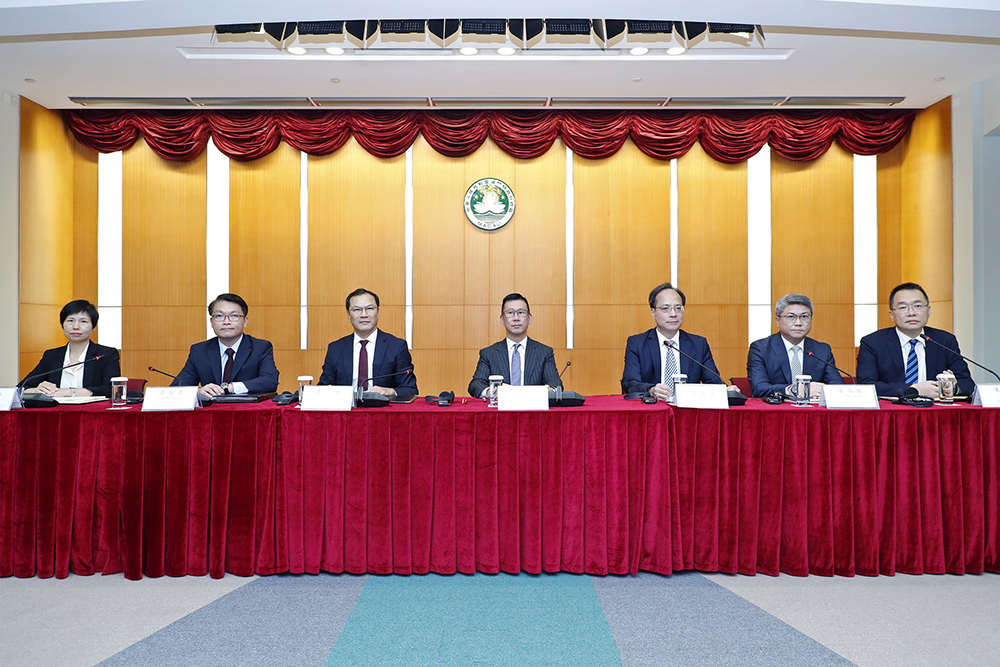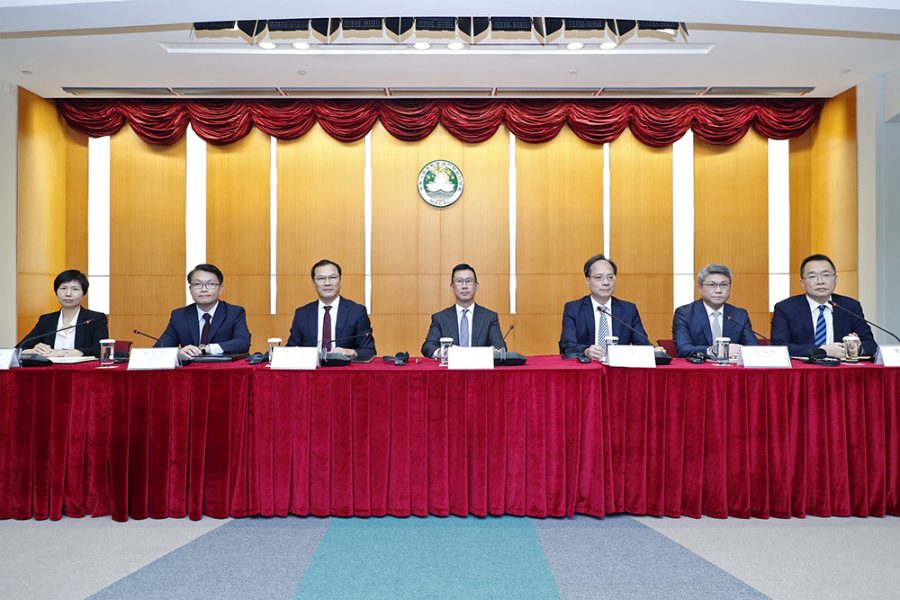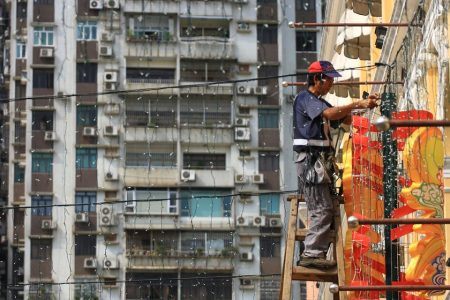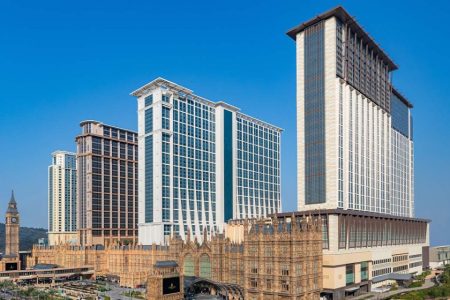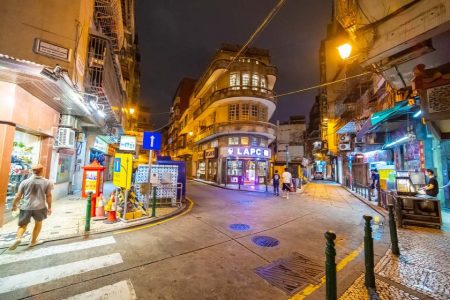The government announced Wednesday that it has contingency plans for the greyhounds from the Macau (Yat Yuen) Canidrome Co. Ltd. in the case that the dogs are left behind at the racetrack in Fai Chi Kei after its official closure Friday night.
However, the government reaffirmed that Yat Yuen must fulfil its “statutory” duties by properly taking care of the racing dogs after the racetrack closes for good.
The government said that it will consider the option of temporarily keeping the greyhounds in the kennels of the Fai Chi Kei racetrack – if it needs to “intervene” and look after the dogs in the case of their abandonment by the betting company.
The government hosted a press conference at Government Headquarters about its possible action after the closure of the racetrack. Officials from a number of government entities attended the press conference.
During the press conference, Civic and Municipal Affairs Bureau (IACM) Vice President Lei Wai Nong said that if the greyhounds are being left behind at the Fai Chi Kei racetrack, his bureau would “surely intervene”, based on the principle of animal protection. He said the government’s “red line” was to ensure that no greyhounds will be rendered homeless.
Lei stressed that his bureau’s possible intervention in taking care of the dogs after the racetrack’s closure “is the last resort”. Lei said his bureau hoped that it will not need to use its contingency plans.
During the press conference, Lei repeatedly urged Yat Yuen to bear its responsibility to properly relocate the greyhounds, take care of them, and arrange for their adoptions after the racetrack’s closure. He urged the company not to “cause troubles to civil society” by fulfilling its previous promise to properly handle the dogs.
Lei there was “no reason” for the racetrack operator to “shirk its responsibility” on the matter as the about 600 greyhounds “are the company’s staff members”.
Lei said that Yat Yuen should not try to “transfer” the responsibility of properly relocating the greyhounds to the government. He said that tomorrow, July 20, “is not the last date” for the company to fulfil its “corporate” responsibility to take care of the dogs, adding that the company must “unconditionally” house and take care of the greyhounds that have still not been adopted, and carry out all the necessary tasks to ensure that the dogs will be adopted by the right people.
Lei stressed that its plans to take care of the greyhounds are contingency ones as Yat Yuen has never said that it will abandon the dogs. “As Yat Yuen has not said it will give up its responsibility [to house and take care of the dogs], the government should not give up its efforts to push the company to take up its responsibility,” he said.
When asked by the media whether temporarily housing the greyhounds at the Fai Chi Kei racetrack was an option for the government to look after the canines, Lei said that as there are kennels at the Fai Chi Kei racetrack and that the greyhounds are used to them, his bureau would consider temporarily housing the dogs there – provided that the racetrack operator abandons them.
During the press conference, Gaming Inspection and Coordination Bureau (DICJ) Director Paulo Martins Chan said that Yat Yuen had applied to the government in October last year for extending and amending the dog-racing concession. At that time the company requested to be allowed to run a business to telecast dog races outside Macau – instead of continuing to run its own dog races – after the slated closure of the racetrack on July 21, 2018, and requested to be allowed to use the racetrack for an additional five years to house the retired greyhounds there, according to Chan.
Chan said that the telecasting of dog races would contradict the principle of animal protection, adding that the proposal could not promote Macau’s economic diversification and the government’s aim to develop the city into a world tourism and leisure centre. He said that therefore government announced last week that it had decided to reject Yat Yuen’s request for the dog-racing transmission proposal and for permission to use the racetrack for an additional period of time.
Chan reiterated that Yat Yuen must vacate the Fai Chi Kei racetrack no later than tomorrow.
Concerning Yat Yuen’s request for the greyhounds to be relocated to the stables at the Taipa horse-racing track run by the Macau Jockey Club, Chan said that such a request needed to be submitted by the horse-racing company. He said that his bureau had never received such a request from the Macau Jockey Club.
Chan noted that according to the MJC horse-racing agreement, the Macau Jockey Club is only allowed to run horse racing, restaurants, ballrooms, and “other entertainment centres” – understood to be casinos – at its Taipa horse-racing venue.
Both Yat Yuen and the Macau Jockey Club are headed by lawmaker-cum-gaming executive Angela Leong On, the fourth wife of nonagenarian retired casino mogul Stanley Ho Hung Sun.
Chan also said he understood that Yat Yuen currently has 129 employees, adding that the Labour Affairs Bureau (DSAL) will provide them with assistance if they need.
The government first told the greyhound racetrack operator in July 2016 to vacate the property in Fai Chi Kei, a public land concession, within two years. The company’s concession to run greyhound racing expires at midnight tomorrow night.
During the press conference, Lands, Public Works and Transport Bureau (DSSOPT) Director Li Canfeng said that his bureau has drafted a preliminary plan for the development of the plot where the greyhound racetrack is located. The plan proposes that it will be used for the construction of schools and sport facilities, with some of its areas to be set aside for government office buildings and government service centres.
According to “O Jogo em Macau” (“Gaming in Macau”), a book published by the Macau government’s gaming regulator in 1985, the city’s greyhound races started on September 28, 1963.
Meanwhile, the Portuguese-language TV channel of government-owned broadcaster TDM reported Wednesday that about 550 greyhound were still in the racetrack kennels.
